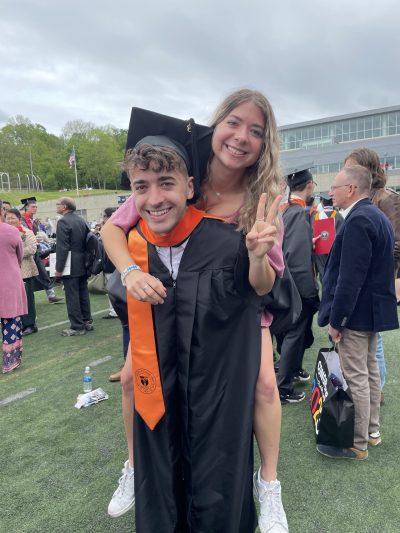Executive Function Coaching for College Students
We are not born with Executive Function and Self-Regulation but they can be developed over time. These skills rely on three types of brain function: working memory, mental flexibility, and self-control.
- Working memory is our “mental workspace” and allows us to retain past and new information over short periods of time.
- Mental flexibility helps us adapt to new situations, shift attention between tasks, demands, ideas or settings.
- Self-control allows us to be mindful, monitor and control our emotions, actions, and responses.
Executive function and self-regulation skills are crucial for academic success. These skills include focusing, strategic planning, flexibility to revise goals, self-control, and advocacy. Students with ADHD, Autism, LD, Dyslexia, Anxiety, and/or other conditions may struggle with executive function, which can affect their ability to meet academic demands.
What is Executive Function Coaching?
College transition is a pivotal period, laden with demands that test the mettle of young adults, particularly their “executive function” skills. CYC is devoted to aiding college students in honing their executive function and self-regulation abilities, furnishing them with a structured pathway for personal growth and academic achievement. We collaborate with students to formulate a personalized learning and organizational system, embedding objectives encompassing mindfulness, self-care, social engagements, sports, clubs, and holistic wellness. CYC’s model ensures sustained support, allowing students to continuously refine and master these skills throughout their collegiate journey.
The myriad of newfound independence and obligations college presents can be daunting, encompassing a spectrum from managing intricate schedules and academic workload to navigating peer interactions and upholding deadlines. As students embark on a journey of self-discovery and empowerment, the need for a heightened sense of responsibility is imperative.
The cultivation of executive function skills, entailing the application of focus, determination, adaptability, self-discipline, planning, and goal-oriented strategies, is indispensable for attaining collegiate success. CYC utilizes pragmatic scenarios and employs the 360 model, introducing techniques and interventions specifically designed to enhance:
1. Determination: To motivate and keep students on their chosen path.
2. Concentration: To maintain focus on tasks and goals.
3. Planning: To effectively organize and structure their time and tasks.
4. Adaptability: To adjust to new challenges and changing environments.
5. Self-Control: To regulate emotions, behaviors, and impulses effectively.
6. Goal-Setting Abilities: To articulate and pursue achievable objectives.
Our approach is rooted in a deep understanding of the unique challenges college students face, providing a holistic, supportive environment for them to develop the necessary skills and resilience to navigate college life successfully. Acquiring lifelong skills and strategies to thrive in their future endeavors.
Time Management
- To create a self-study guide from multiple sources of information, start by organizing all the materials in a way that makes sense to you.
- Use headings, bullet points, and summaries to condense the information.
- Practice spaced retrieval by reviewing the material at intervals over time.
- For test-taking strategies, allocate time to each question based on difficulty level, and practice relaxation techniques to decrease anxiety. After the test, review your performance to guide future study efforts.
- Finally, create a study plan and environment that minimizes distractions and promotes focus and memorization.
Task Management
- To break down instructions and plan steps for completion, try breaking tasks into smaller, manageable pieces and creating a to-do list.
- Use a planner or calendar to map out multi-step tasks and avoid procrastination by setting deadlines for each step.
- To balance workload with extracurriculars and social opportunities, prioritize tasks and schedule time for relaxation and fun activities.
- To stay focused on boring or difficult tasks, try breaking them up with frequent breaks, listening to music or changing your environment.
- For large term projects, break them into smaller tasks and set deadlines for each step.
- Don’t wait until the last minute to start, and consider asking for help or feedback along the way.
Research and Writing
- To research effectively, start by identifying and creating search terms that best describe your topic.
- Read and integrate information from multiple sources to gain a comprehensive understanding of the subject.
- Develop your argument or analysis based on the information gathered.
- Create systems to store and organize research materials such as using folders, labels, or digital tools.
- When constructing a thesis, focus on developing strategies that provide meaning and depth to your writing.
- Use revision tools to refine your writing and develop your voice.
Information Management
- To improve reading comprehension and note-taking skills, try active reading by asking questions and summarizing key points.
- For memory, paraphrase instructions and use mnemonic devices.
- To combat perfectionism, set realistic goals and focus on progress rather than perfection.
- For participation in class discussions, prepare ahead of time and actively listen to others.
Test Preparation
- To create a self-study guide from multiple sources of information, start by organizing the information into categories or topics.
- Then, create a study plan that includes regularly reviewing the material over time and testing your knowledge through practice questions or quizzes.
- To improve test-taking strategies, allocate time and pace yourself, stay relaxed, and decrease anxiety.
- After taking a test, engage in a test review to identify areas for improvement and guide future performance.
- Finally, create a study environment that is conducive to attention and memorization.
Attention
- To sustain concentration during class or study periods, it’s important to manage and minimize distractions, recognize and manage stress, and identify strategies and tools that have helped you in the past.
- Additionally, self-reflection, flexibility, and understanding the teaching styles and academic demands of your professors can also be helpful.
Organization
Here are some tips for managing school materials and organizing your digital life:
- Create a system for organizing digital files and folders, such as labeling them by subject or semester.
- Use a school learning portal, like Canvas, to keep track of assignments and due dates.
To manage your environment for optimal studying:
- Create a designated study space with minimal distractions.
- Keep your study space organized and tidy.
- Utilize noise-cancelling headphones or ambient noise apps to block out distractions.
To consistently check and reply to emails:
- Schedule specific times throughout the day to check and respond to emails.
- Utilize email filters and folders to prioritize and organize emails.
For planning time and tasks:
- Use a planner or online scheduling tool to keep track of deadlines and tasks.
- Break down larger tasks into smaller, manageable steps.
- Prioritize tasks based on their importance and urgency.
Self-Care and Independent Living
- The three areas you mentioned are important for student success: self-advocacy, self-care, and independent living.
- Self-advocacy helps students identify their needs and connect with resources to achieve academic success.
- Self-care includes sleep hygiene, exercise, and nutrition.
- Independent living involves. developing executive function skills such as punctuality, budgeting, and housekeeping to manage daily life.



